Popular:
Popular:
Fleeing Russian anti-Semitism and fueled by a centuries-old yearning to establish their Jewish Homeland on ancestral land, Jews of the early Zionist movement immigrated to Palestine, then part of the Ottoman Empire, hoping to build a more secure future where they wouldn’t face religious persecution.
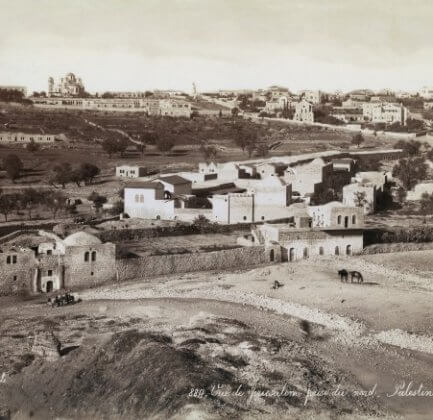
As Jewish immigrants purchased as much land from Arabs as they could, Arabs increasingly felt like they were losing all of their land and that the Ottomans were not protecting their rights. Collective resentment and suspicion toward the Jews started to build among Arab inhabitants.
Jews were thrilled as the British government declared its support for a national home for the Jewish people in Palestine as part of the Balfour Declaration. This milestone was official recognition of their quest in front of the world.
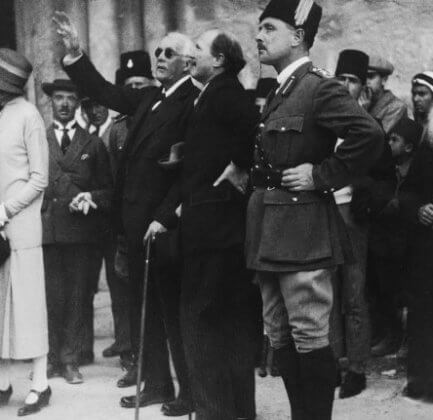
Arabs felt betrayed and humiliated by the Balfour Declaration, especially after the British previously pledged to support Arab independence and a unified kingdom of Arab lands if they revolted against the Ottoman Turks.
In light of pro-Palestinian British government policies, outlined in the White Paper, which placed increasing restrictions on Jewish land purchases within Palestine and, especially, Jewish immigration to Palestine, even during the Holocaust, when Jews were being murdered in Europe, Jewish underground groups in Palestine bravely engaged in paramilitary actions against British Forces. The culmination of Jewish resistance to British rule was the strategic bombing of the British administrative headquarters in Jerusalem’s King David Hotel by the militant right-wing Irgun.
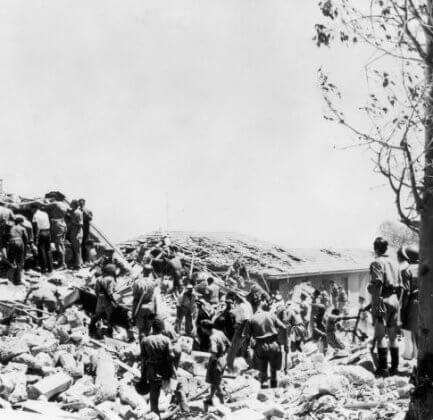
The Jews using terror against the British to get what they want is futile. Following the successful Arab Revolt, the British government finally understands that a Jewish national home will only succeed if it is in an independent Palestine with an Arab majority. As laid out in the White Paper, the British government wisely decides that no Jewish state will be allowed without Arab support.
Settling for the best they thought they could achieve, Zionists compromised on their national aspiration and warily accepted the UN partition plan, which divided British-mandate Palestine into separate Jewish and Palestinian states, with Jerusalem under UN rule.
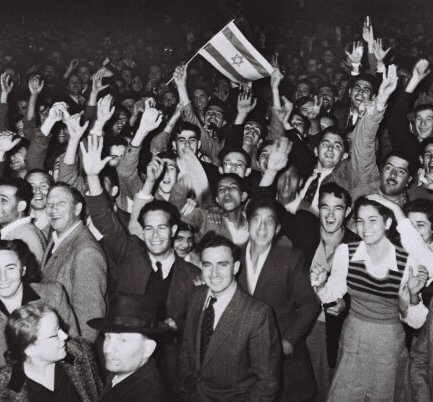
The Arabs of Palestine and in surrounding Arab states rejected the partition plan, as it did not represent the demographics at that time. They didn’t want to share a land that had been their undisputed home for centuries.
With pride and jubilation, Zionist leaders declared the establishment of the State of Israel, promising equal rights to Israel’s Arab inhabitants. David Ben Gurion extended peace to all neighboring Arab states. Though far from perfect, for the first time in history, the Jews had a country they could call their own, especially significant after the suffering they endured during the atrocities of the Holocaust. Their celebration was cut short when they were forced to fight for their lives against an all-out Arab attack.
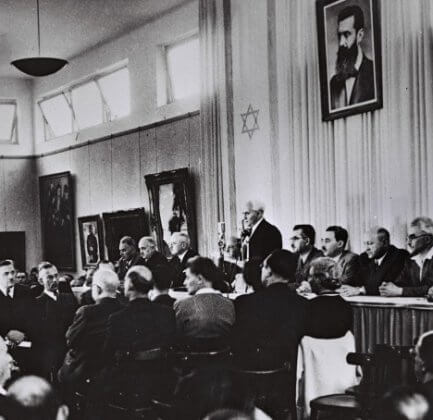
Failed by the colonial powers, who were short-changing them on their own land, the Arabs of Palestine and surrounding Arab countries had to take matters into their own hands and immediately invaded Israel. Some 700,000 Palestinians fled their homes in fear during the war, known as “Al-Nakbah” (“The Catastrophe”). Many never made it back to reclaim their rightful properties and, until today, still dream about returning to their homes in Palestine.
Defending its still fragile existence against massive Arab armies preparing to invade its borders, Israel pre-emptively attacked its neighbors. Despite being severely outnumbered and out-armed, the Jews heroically surprise and beat the Egyptians, Jordanians and Syrians, who were out for Jewish destruction. In a mere six days, they victoriously seize the Sinai Peninsula, Golan Heights, Gaza Strip, West Bank and East Jerusalem, reuniting their holy city.
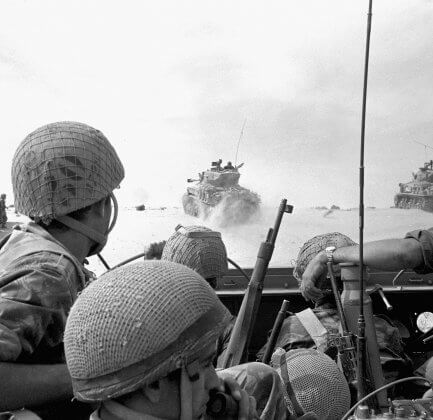
Unprovoked, Israel aggressively attacks Egyptian, Syrian and Jordanian forces and seizes their territory. Arabs suffer a humiliating defeat as the Israeli aggressors and their Western-sponsored army begin occupying and establishing new Jewish settlements in Arab lands in the West Bank, Gaza, Sinai and East Jerusalem. It’s clearer than ever that the Palestinians can’t depend on surrounding Arab nations and rally behind their own leadership, the PLO, created in 1964 and led by Yasser Arafat.
While the whole country was collectively observing Yom Kippur, the holiest day of the Jewish calendar, Egyptian and Syrian forces shocked Israel at its most vulnerable when it launched a coordinated attack. Despite being unprepared and outnumbered, the Israeli army beat back Egypt, Syria, who were armed with Soviet weapons and supported by Jordanian and Iraqi troops, recapturing the Golan Heights – but with heavy casualties. Prime Minister Golda Meir was forced to step down, but memorably held that “Israel will only have peace when Arabs love their children more than they hate us.”
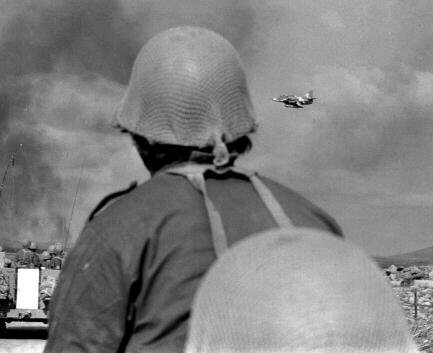
Hoping to win back the territory captured by Israel during the 1967 war, Egypt and Syria seize the opportunity and launch an attack against Israel on Yom Kippur, when most of the army will be away from their posts. With the Jewish state four times its previous size, it is time for the Arab nations to regain their land at the Golan Heights and the Sinai Peninsula, plus, their standing in the region. Despite defeat for Syria, Egyptian president Anwar Sadat is commended for Egypt’s success, which sets the stage to seek a ceasefire with Israel.
After a road accident between Israeli soldiers and Palestinians ends in civilian fatalities, the Palestinians overreact, establishing a protest movement with civil disobedience and organized violence against Israeli civilians and soldiers. Throughout the Intifada, tens of thousands of Israeli security forces are forced to quell increased Palestinian violence. These defensive actions are met with even more Palestinian aggression.
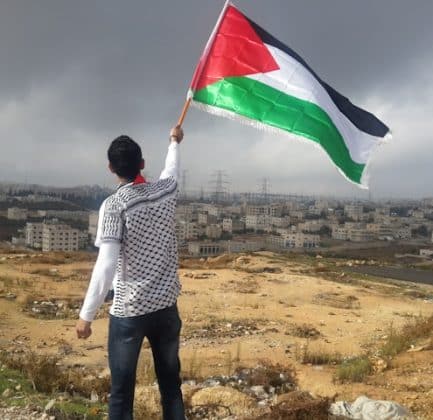
Unified in its struggle against the oppressive Israeli occupation, Palestinians across the West Bank and Gaza stand together throughout a six-year uprising to express pent-up anger and frustration at living under Israeli rule. Their desire to live free from Israeli rule is a more powerful force than Israeli tanks. In total, more than 1000 Palestinians were unnecessarily killed because of Israel’s excessive use of force.
After Israeli civilians endure decades of terror attacks at the hands of the PLO, which proved to be an organization bent on liberating Palestine through armed struggle and violence, Israeli Prime Minister Yitzhak Rabin rises above past animosity and historical grudges and proves Israel’s desire for peace. He takes a leap of faith by signing the “Declaration of Principles,” recognizing the PLO, and, in return for peace, agreeing to a limited withdrawal of the Israeli army from parts of Gaza and West Bank to make way for Palestinian autonomy in return for peace.
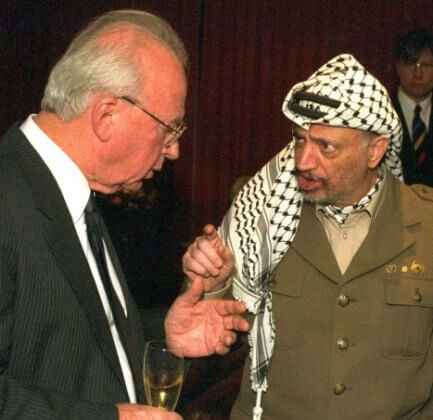
Despite decades of Israeli occupation, freedom fighter and PLO Chairman Yasser Arafat breaks from his organization’s long-standing commitment to armed struggle. Proving Palestinians’ desire for peace, he signs the Declaration of Principles, thereby historically renouncing violence against his sworn enemy and recognizing the right of Israel to exist. In doing so, he brings his people hope for the creation of a Palestinian interim self-government, the Palestinian National Authority.
Carrying out its commitment to peace, Israel yields civilian and security control to the Palestinian National Authority over parts of the West Bank and Gaza Strip, which turns out to be a fatal sacrifice for Prime Minister Yitzhak Rabin, who was consequently assassinated by an Israeli right-wing extremist. The majority of Israelis are devastated by the loss of their respected leader, who represented a future toward peace.
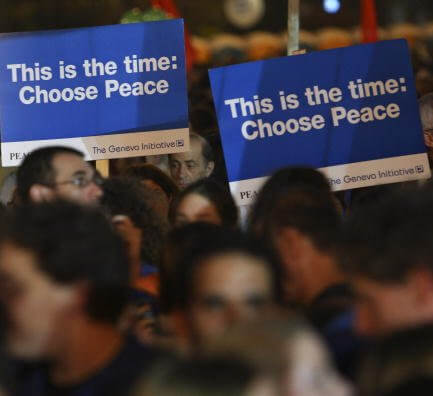
Palestinians welcome the long-awaited expansion of self-rule and civilian control over almost one-third of the West Bank and the majority of the Gaza Strip. This move finally enables them to hold Palestinian elections and move forward toward independence. The assassination of Rabin leaves Palestinians feeling nervous about the future of the peace process going forward.
Israel feels that handing over 95% of the West Bank and Gaza to the Palestinian National Authority for the formation of an independent Palestinian state is generous. However, Israel’s insistence at maintaining a small presence and 5% control of both territories is vital and understandable for the sake of the country’s national security.
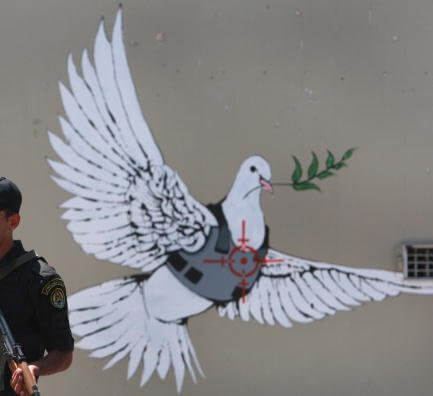
Palestinians feel they deserve 100% of the territory in both the West Bank and Gaza, as both, in total, comprise merely 22% of the original Palestine. Israel’s unacceptable proposal would divide Palestine into disconnected regions, with one in the West Bank and the other in Gaza, making it hard to control them, especially as each area contains around 1.5 million Palestinians.
The second Palestinian intifada that erupted after Israeli Prime Minister Ariel Sharon went to the Temple Mount was planned long before his visit. It was a pre-meditated tactic to wait for an excuse to ignite more violent and unwarranted attacks against Israel. It also shows that they can’t be trusted to stick to a peace agreement
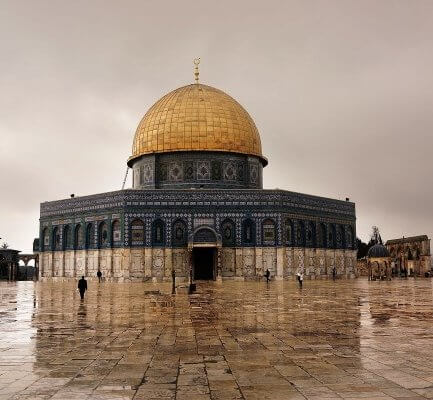
As Jews don’t usually visit the Temple Mount, as part of a long-standing status quo understanding, Israeli head of opposition Ariel Sharon’s visit with 1000 soldiers deliberately provoked large-scale Palestinian demonstrations, fueled by justified frustration over the continued Israeli occupation. Still under Israeli occupation, Palestinians have no other way to protest.
While the U.S.-sponsored Security Council Resolution 1397 called for the immediate cessation of all acts of violence, it unjustly rewarded the Palestinians for their violence by endorsing a future Palestinian state. Once again, bias against Israel is front and center at the UN.
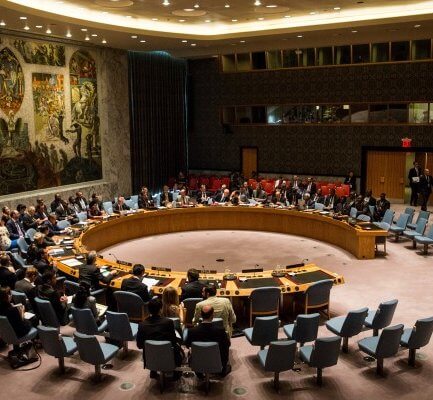
The U.S.-led Security Council Resolution 1397 was a historic step forward. It is enthusiastically welcomed by Palestinians, as it’s the first time a UN Security Council resolution accepted a Palestinian state and corrected decades-long wrongdoing.
To rid itself of a long-standing security burden and source of friction with the Palestinians, Israeli Prime Minister Ariel Sharon bravely decides to dismantle and evacuate all Israeli settlements in the Gaza Strip and fully withdraw the army. His courageous effort divides Israelis but shows Israel’s determination to bring about peace.
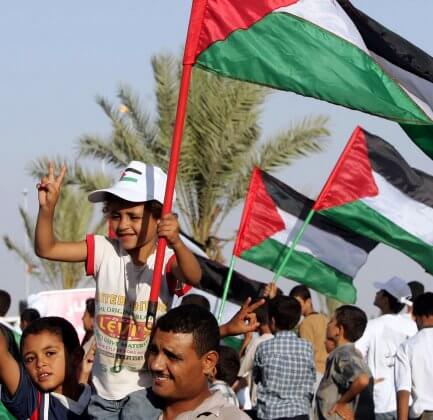
Israel’s withdrawal from the Gaza Strip is a victory for Palestinians and is considered an important achievement of the Palestinian resistance operations, which will continue until a Palestinian state is realized. For a major part of the population, it is inspiring to see that carrying out terror attacks and using force by a brave few can weaken Israeli occupiers enough to make them withdraw.
Israel feels it no longer has a peace partner now that the radical Islamic party Hamas, which Israel, the United States and the EU all designate as a terrorist organization, receives the majority of votes in the Palestinians’ second general election. This victory is disastrous, as Hamas, unlike the previously ruling party, Fatah, which has evolved into a secular governmental incarnation of the PLO, refuses to recognize the existence of Israel. Terrorists will now have the majority of seats in the Palestine Legislative Council.
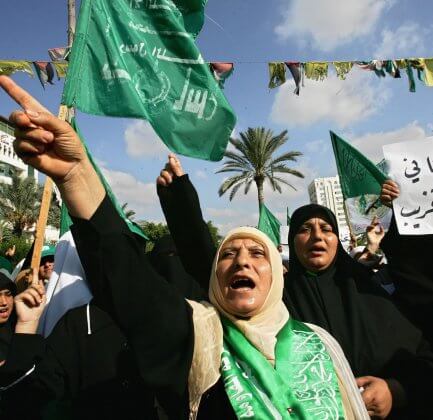
The Palestinian people have spoken with Hamas’s parliamentary win over Fatah. This landslide victory for Hamas is a welcome one, as the party, who will lead the formation of the next Palestinian National Authority cabinet, will not be bullied so easily by Israel and the western world. With Hamas in power, the Palestinian’s won’t have to give too much and settle for too little, which was the case until now.
Israel distrust of Hamas grows as it violently takes control of Gaza and physically forces the Fatah party, including Palestinian President Mahmoud Abbas out of Gaza, banning them to the West Bank. In response to Hamas seizing control over Gaza, Israel orders a land and air blockade on Gaza. Knowing it has no peace partner in Hamas leader and Palestinian Prime Minister Ismail Haniyeh, Israeli warily eyes its last chance for peace in the West Bank, where a weakened yet secular Fatah now will rule.
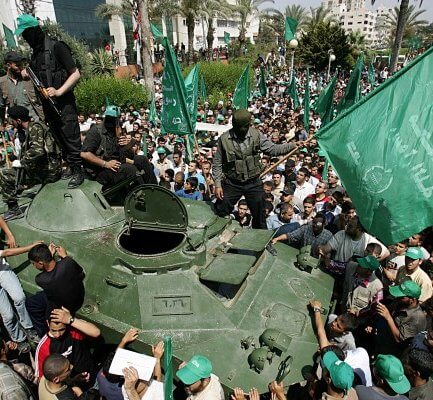
After Hamas removes Fatah officials from Gaza, uncertainty prevails as Fatah member and Palestinian President Mahmoud Abbas tries to restore calm and control from the West Bank. With the unity government now dissolved, and Gaza and the West Bank politically divided into two Palestinian entities, Hamas asserts its power from Gaza, warning that “the era of justice and Islamic rule have arrived.”
To defend its vulnerable citizens from the barrage of rockets that Hamas fires into Israel from Gaza, Israel exhausts all non-military strategies and diplomatic overtures before being forced to conduct an aerial bombardment and ground invasion into Gaza to deter Hamas from its unprovoked attacks. Israel is still unfairly criticized for defending itself.
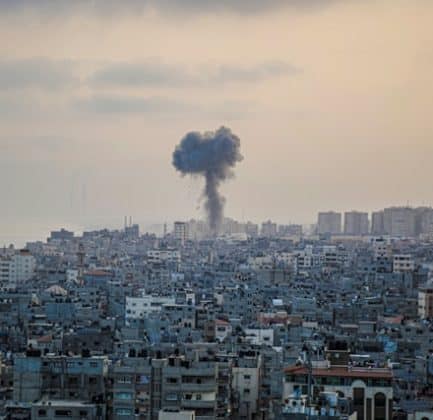
Israel’s exaggerated bombardment on Gaza inflicts massive damage on both Hamas militants and innocent civilians, causing major destruction and death, for which Hamas retaliates by firing more rockets into Southern Israel. Israel’s excessive use of force leaves Hamas no choice but to target Israeli civilians, as it stands no chance against Israeli tanks and jets. Therefore, out of desperation, Hamas keeps shooting rockets to protect its vulnerable citizens.
By siding with the militant Hamas in Gaza, Fatah member and Palestinian President Mahmoud Abbas has put the peace negotiations into jeopardy. Israel can’t trust a Palestinian government when half of it still calls for the destruction of Israel.
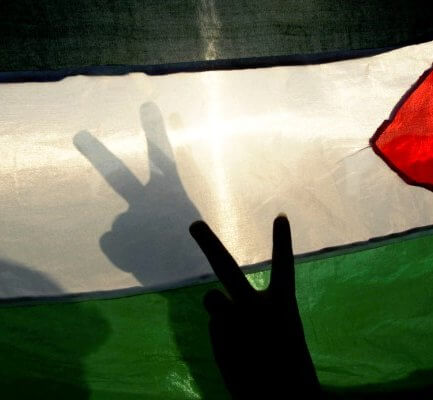
Palestinians celebrate as rival factions Hamas and Fatah agreed to form a unity government, hold new elections, and attempt to collaborate on achieving a life-long aspiration of establishing an independent Palestinian state.
Following the Hamas kidnapping and murder of three Israeli teens in June, and in self-defense against increasing rocket attacks on its cities and innocent civilians, Israel is forced to launch an air and ground assault on Gaza. This operation is the only way to halt Hamas’s ceaseless, unprovoked rocket attacks and organized attempts to perpetrate cross-border attacks through underground tunnels.
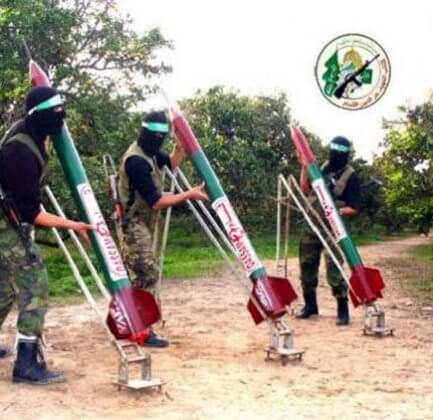
Israel’s air, ground and naval assault on the Gaza Strip result in destroying innocent more than 2000 Palestinian lives, among then hundreds of harmless children and women, as well as infrastructure and housing. Civilian lives were unjustly taken in Israel’s disproportionate attack. Rockets are the only legitimate response for a people who are barricaded.
Israel is shocked at being betrayed by its greatest ally, the United States, as the Obama administration abstains during a UN Security Council vote, thus allowing the anti-Israel body to pass a resolution officially condemning Israel’s construction of Jewish settlements in West Bank.
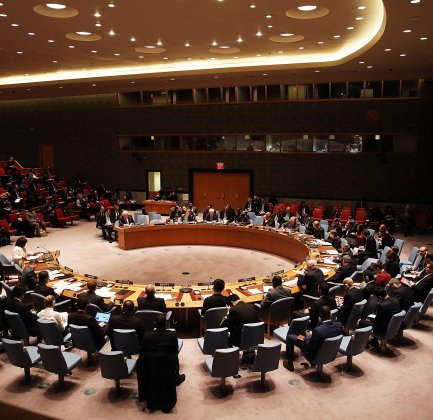
Finally, the United States has come to its senses, refusing to be manipulated by the Israelis into standing up for them at the United Nations. Instead, President Obama does what’s right and doesn’t get in the way of allowing official worldwide condemnation of Israel’s settlement construction, the real threat to peace.
On behalf of Israel’s greatest ally, an unflinching President Trump finally confirms to the world what the Jewish people have known for 3000 years and what has been a day-to-day reality for Israelis for decades: that Jerusalem is the official capital of Israel. In announcing America’s intention to move its embassy from Tel Aviv to Jerusalem, Trump signifies to the Arab world that any future peace deal or threats of violence will not change Israel’s right to exist with Jerusalem as its holy and justified capital.
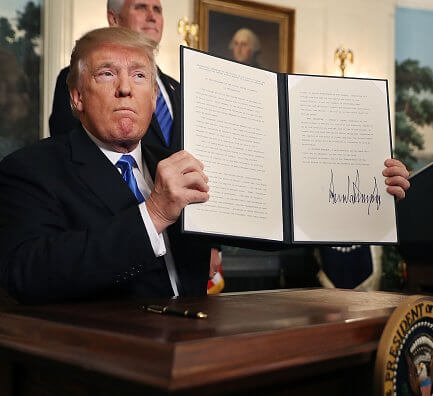
It’s a heartbreaking day when our beloved Holy City is taken away because someone signed it so. The US President’s declaration of recognizing Jerusalem as the capital of Israel is a brutal assault on one the Arab world’s most sacred issues. Trump’s decision means the end to any peace process. It also endangers America’s standing in the Arab world and will carry disastrous consequences. At least he has unified all Palestinians against America’s embassy plan.
A new chapter in the history of the Middle East has begun with the signing of the Abraham Accords, which will normalize Israel’s relations with Bahrain and the United Arab Emirates (UAE). This significant agreement will promote religious co-existence and peace among Israel and its Arab neighbors by bringing new, far-reaching opportunities for cooperation based on boosting economic ties and trade, which the Palestinians could also benefit from if they will ever be open to making compromises.
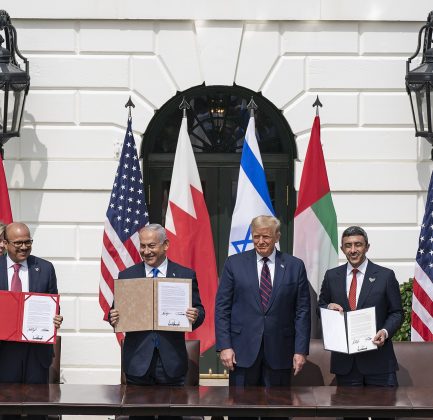
The Abraham Accords is a stab in the back by the Arab world. They are selling out the Palestinians for their own economic interests. Any solution that doesn’t advance the Palestinian question is short-sighted and will prove to be short-lived. The Palestinian question, which was supposed to be at the heart of the deal, has, instead, been relegated to the periphery. Once again, the Palestinians have been abandoned by their allies.
